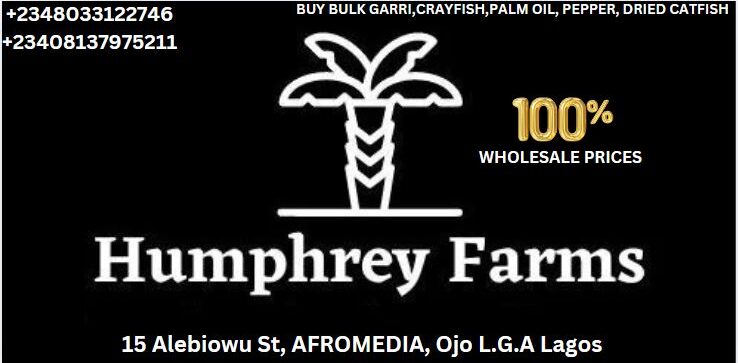
Bulk Palm Oil Exporters Nigeria: Discover Humphrey Farms
In the vibrant and ever-growing market of palm oil, finding a reliable and reputable supplier is crucial for businesses worldwide. For those seeking high-quality palm oil produced on a large scale, look no further than Humphrey Farms, Nigeria’s leading bulk palm oil exporters.
Also, Read
How Does Palm Oil Business Work?
Why Choose Humphrey Farms?
At Humphrey Farms, we take pride in our commitment to excellence in the production and exportation of palm oil. With our extensive experience and state-of-the-art facilities, we have become a trusted name in the industry. Here’s why Humphrey Farms stands out:
1. Unmatched Quality: Our palm oil is derived from the finest palm fruits, processed using advanced techniques to ensure purity and consistency. We adhere to stringent quality control measures to deliver a product that meets international standards.
2. Large-Scale Production: Humphrey Farms specializes in large-scale palm oil production. Our facilities in Edo State and Lagos, Nigeria, are equipped to handle bulk orders efficiently, making us a reliable partner for businesses looking to source significant quantities of palm oil.
3. Strategic Locations: With branches in both Edo State and Lagos, we offer convenient access to key markets. Our strategic locations enable us to manage logistics effectively, ensuring timely delivery of your orders.
4. Dedicated Customer Support: Our team is committed to providing exceptional customer service. Whether you have inquiries, need assistance, or require specific arrangements, we are here to support you every step of the way.
Our Offerings
At Humphrey Farms, we provide a range of palm oil products to meet diverse needs. From crude palm oil to refined palm oil, our products cater to various industries, including food production, cosmetics, and pharmaceuticals. Whatever your requirement, we have the expertise and resources to fulfill your order with precision.
Get in Touch
Ready to elevate your business with premium palm oil from Nigeria? Contact Humphrey Farms today to discuss your needs and place your order. Our dedicated team is available to assist you through every step of the process.
Phone/WhatsApp: +2348033122746, +23408137975211
Email: [email protected]
Experience the difference with Humphrey Farms, where quality meets reliability. Join the many satisfied clients who trust us for their palm oil supply needs. We look forward to partnering with you!
How Much Is A Ton Of Palm Oil In Nigeria?
In recent months, the price of palm oil in Nigeria has seen a dramatic rise, prompting questions about the cost of this essential commodity. As manufacturers scramble to meet their needs, the stark reality of the market has become evident: a ton of palm oil in Nigeria now costs between N1-1.2 million. This figure not only highlights the escalating expenses but also underscores broader issues within the industry.
The Rising Cost of Palm Oil
The surge in palm oil prices is a pressing concern for both consumers and businesses in Nigeria. As of recent reports, a liter of palm oil has increased from N1,000 to N1,500, while a 20-liter container has jumped from N19,500 to N30,000. These price hikes are indicative of a deeper issue: the significant disparity between local production costs and imported prices.
For context, in the Malaysian export market, a ton of palm oil is priced at approximately $900 (N675,000). This stark difference in pricing not only highlights the inefficiencies within Nigeria’s palm oil sector but also the substantial financial burden on Nigerian consumers and businesses.
Historical Context and Current Challenges
Nigeria was once the world’s leading palm oil producer, holding a 43% share of the global market in the early 1960s. However, this dominance has long since faded, with Malaysia and Indonesia now leading the industry. These two countries collectively account for 85-90% of global palm oil production.
The decline in Nigeria’s production is troubling. Once a major player in the global market, Nigeria now accounts for less than 2% of global output. Despite policies aimed at reducing imports and boosting local production, Nigeria continues to spend over $500 million annually on palm oil imports. This situation reflects a significant gap between potential and actual production capacity.
Factors Contributing to High Prices
Several factors contribute to the high cost of palm oil in Nigeria. The shift in focus towards crude oil production has led to a neglect of the palm oil sector. Additionally, there is a lack of investment in modern agricultural practices, which has hampered local production.
The price disparity between locally produced and imported palm oil highlights the inefficiencies and challenges within Nigeria’s palm oil industry. Despite efforts to restrict forex access for palm oil and close borders, the domestic market remains volatile and expensive.
Future Outlook
To address the soaring prices and improve the local palm oil sector, there needs to be a comprehensive strategy. This includes investing in modern agricultural practices, enhancing plantation development, and addressing the demand-supply gap. Experts emphasize the importance of adopting Good Agricultural Practices (GAP) to improve production efficiency and reduce costs.
The current state of Nigeria’s palm oil market is a call to action. As the country seeks to overcome these challenges, focusing on increasing production, reducing dependency on imports, and making the industry more competitive will be crucial for stabilizing prices and ensuring a steady supply of palm oil.
==========================================
The cost of a ton of palm oil in Nigeria, now ranging between N1-1.2 million, serves as a stark indicator of the broader issues facing the industry.
With historical dominance in palm oil production and significant potential, Nigeria has the opportunity to reclaim its position in the global market.
However, this requires strategic investment, modernization, and a renewed focus on the palm oil sector. The road ahead is challenging, but with concerted effort and innovation, Nigeria can address these issues and restore stability to the palm oil market.
How Can I Export Palm Oil From Nigeria?
Palm oil is a highly sought-after commodity, not only in Nigeria but across the globe. Known for its versatility and extensive applications in various industries—from food production to cosmetics—palm oil holds a significant place in the global market. Despite West Africa’s rich history as a leading palm oil producer, recent times have seen a decline in local production. This creates a unique opportunity for those looking to tap into the export market.
If you’re considering exporting palm oil from Nigeria, here’s a comprehensive guide to help you navigate the process. And when you’re ready to take the plunge, Humphrey Farms is your go-to partner for bulk palm oil exportation.
Understanding the Global Market
To successfully export palm oil, it’s crucial to have a clear understanding of the global market. Palm oil is integral to many industries, including food, cosmetics, and biofuels. Knowing the market demands and requirements will help you tailor your business strategy effectively. For instance, major importing countries like India, China, and the Netherlands are key players to target.
Sourcing Your Palm Oil
One of the first decisions you need to make is whether to process the palm oil yourself or purchase it from an established supplier. If you choose the latter, finding a reliable and consistent supplier is essential.
This is where Humphrey Farms excels. As a leading name in bulk palm oil production and exportation in Nigeria, Humphrey Farms offers high-quality palm oil from their branches in Edo State and Lagos.
With their extensive experience and robust supply chain, they can provide you with the palm oil you need, whether you’re looking for crude or refined options.
Documentation and Legal Requirements
Exporting palm oil requires thorough documentation to comply with both local and international regulations. Here’s what you need:
- Company Registration: Before you can export, you need to register your business. This involves creating a company—either as a sole proprietor or a Limited Liability Company (LLC). Ensure you meet all requirements, including having a registered address and submitting necessary documents to the Corporate Affairs Commission (CAC).
- Nigerian Export Promotion Council (NEPC): Register with the NEPC for guidance on export best practices and access to foreign buyers. They provide valuable resources to ensure your business complies with export regulations.
- Quality Assurance: Your palm oil must meet international quality standards. Obtain certification for quality assurance and ensure that your product is properly labeled with NAFDAC numbers, production dates, and expiration dates.
- Shipping Documents: Depending on your chosen method of transportation, you’ll need specific shipping documents. Engage with a reputable shipping company experienced in handling commodity exports. They will assist you with customs documentation and other necessary paperwork.
Finding Your Buyers
With digital advancements, finding and connecting with international buyers has become easier. Leverage trade websites and online platforms to identify potential clients. Focus on countries with high demand for palm oil, such as India, China, and the Netherlands. Building relationships with these buyers can help establish long-term partnerships.
Why Choose Humphrey Farms
When it comes to sourcing and exporting palm oil, Humphrey Farms stands out as a premier partner. With branches in both Edo State and Lagos, they offer a reliable supply of high-quality palm oil suited for various markets. Their expertise in large-scale production and exportation ensures you get consistent and premium products.
Contact Humphrey Farms today to discuss your palm oil needs and explore how they can support your export business.
Phone/WhatsApp: +2348033122746, +23408137975211
Email: [email protected]
Conclusion
Exporting palm oil from Nigeria presents a promising opportunity, but it requires careful planning and adherence to regulatory standards.
By understanding the market, sourcing quality products, and managing documentation effectively, you can navigate the export process successfully.
Partnering with industry leaders like Humphrey Farms can provide the expertise and support you need to make your export venture a success. Explore the possibilities today and tap into the thriving global palm oil market.

Leave a Reply
You must be logged in to post a comment.